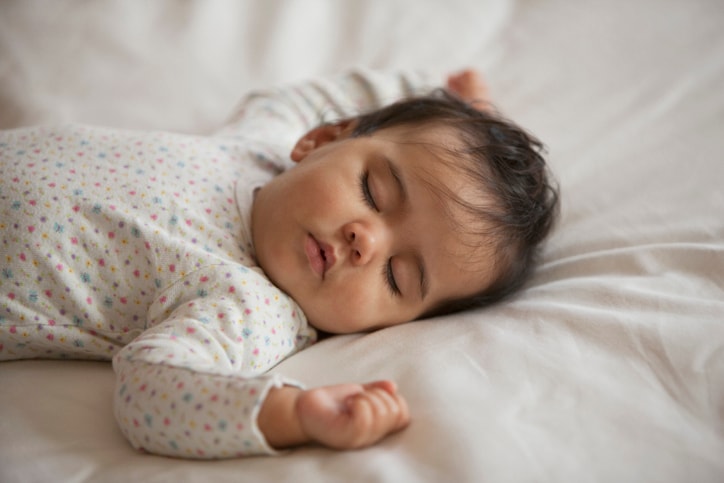In this article
They twitch, move and even smile while they’re snoozing, but do babies dream while they’re asleep? And if so, what on earth do babies dream about?
“Babies spend more than 50% of their time sleeping in rapid eye movement sleep (REM),” explains Dr. Dylan Ochal, a pediatrician at Ocean Pediatrics in Orange County, California. “In older children and adults, dreams occur during REM sleep, which is where they spend about 20% of their time sleeping.”
“REM sleep is when the body is relaxed but the brain is active,” Ochal continues, “So it’s not uncommon to see your baby’s eyelids fluttering or for them to make sounds which may indicate dreaming.”
Wondering if your newborn really is having sleep dreams when you put them to bed? Here, Ochal and other experts break down the adorableness that is baby dreaming.
Key takeaways
- Babies spend more than 50% of their sleep time in REM sleep.
- REM sleep is the sleep stage where dreams generally occur.
- Some research says babies do, in fact, dream, but it’s tricky since they can’t yet verbalize.
Do newborns dream?
Babies, who spend lots of time in REM sleep, “experience deep emotions during this stage,” explains Dr. Tara Kotagal, a pediatrician at Lurie Children’s Hospital in Chicago. “However, it’s hard to know if they are actually dreaming.”
The reason? “Newborns don’t have the ability to report dreams later, so we have no way to know,” says Dr. Michelle Caraballo, a pediatric pulmonologist and sleep medicine specialist at Children’s Health in Dallas.
“Some experts believe that babies do dream,” she adds, “while others think it’s more likely that they do not dream until later in life.” Either way, she notes, REM sleep is very important for a newborn’s brain development.
When do kids start dreaming?
Some research suggests babies can begin dreaming as early as 6 months old, notes Riley Otis, a certified sleep science coach at Sleepopolis. (Other studies have posited that babies start dreaming even earlier.)
That being said, it’s more common to start processing dreams, and have dreams with more complexity, once the child gets older. “The quality of emotions and thoughts occurring during REM sleep changes as a baby grows older and as their brain develops,” notes Kotagal. “During a baby’s first year of life, moments of deep sleep evolve more into what we call ‘dreams.’”
Ochal adds that it’s common for kids to start communicating about their dreams at around age 2. “This is about the same time that kids typically develop the ability to speak simple phrases, leading us to believe that babies likely start dreaming before they develop the ability to tell us about them,” she explains.
What do babies dream about?
Milk? Their parents? What do babies dream about? Again, it’s tough to know since they can’t verbalize what they’re thinking, but, Kotagal notes, since dreams generally involve processing emotions and events from one’s day, “we can expect babies to dream about feeding and bonding with their loved ones.” Adorable.
Ochal adds that since it’s safe to assume babies’ dreams mirror their experiences and development, their dreams likely entail “brief images or sounds, as opposed to complex stories or imaginative scenarios.”
Why do babies twitch and move in their sleep?
Instead of konking out after a long day being cute, babies are active sleepers, says Ochal — and while their movements can sometimes be worrisome to parents and caregivers, they’re generally perfectly normal.
“During REM sleep babies may grimace or vocalize brief cries or sighs,” notes Ochal. “They may even twitch or move so much it seems like they are awake — this is known as benign sleep myoclonus of infancy. It looks like a brief jerking of the limbs while asleep, and is typically bilateral and symmetrical. It occurs during non-REM sleep and is not a seizure, though sometimes can look seizure-like which can be alarming to parents.
While twitching and sighing during sleep is typically completely benign, reach out to your child’s pediatrician if you ever have concerns about baby’s movements during sleep.
One more expert note on baby dreaming
While it’s hard to say for sure if babies dream, due to their lack of communication, newborns do spend a lot of time in REM sleep, “which is the stage of sleep where we have the most vivid dreams,” according to Caraballo
And if you’re worried about your little one having unsettling dreams when they’re catching some zzz’s, don’t be. “If babies do experience dream-like sensation, their brain likely shows them familiar sensations, such as the feeling of being rocked, and familiar faces and voices,” says Otis. “As children get older and gain more life experiences, the brain is able to imagine more complex scenarios that we typically associate with dreaming.”




